Episode 298: Mastering HubSpot - Attribution, Form Optimization & CMS Enterprise Secrets
Welcome to HubShots Episode 298: Mastering HubSpot - Attribution, Form Optimization & CMS Enterprise Secrets This edition we dive into: Be...
22 min read
 HubShots
Updated on September 11, 2020
HubShots
Updated on September 11, 2020
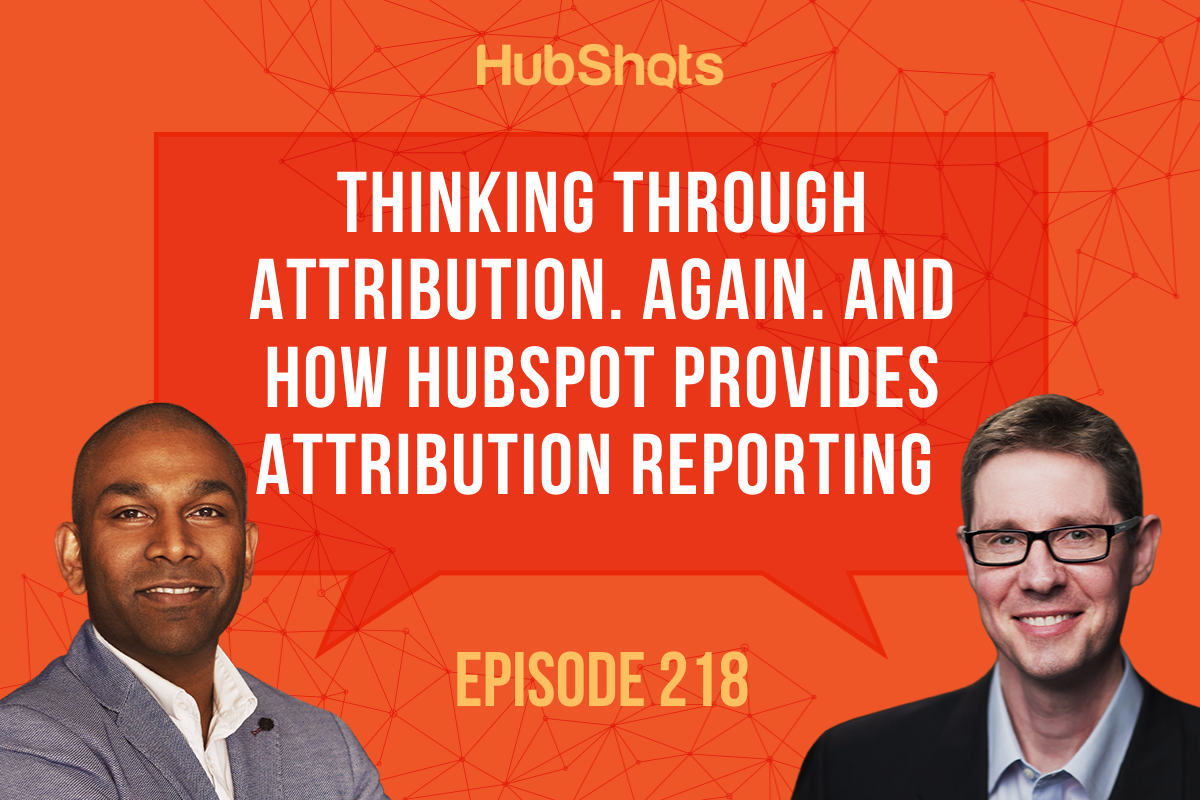
This episode we discuss:
You can listen to this episode of the show here: https://soundcloud.com/hubshots/218-thinking-through-attribution-again-and-how-hubspot-provides-attribution-reporting
Did a colleague forward this episode to you? Sign up here to get yours every Friday.
Please forward this on to your work colleagues.
HubShots, the podcast for marketing managers and sales professionals who use HubSpot, hosted by Ian Jacob from Search & Be Found and Craig Bailey from XEN Systems.
Recorded: Wednesday 09 September 2020 | Published: Friday 11 September 2020
I’ve been diving deeper into attribution lately - aiming to get insights that are actionable (as opposed to just interesting).
Attribution is one of those fancy sounding words that gives you the impression it requires deep analytical skills, but in practice there’s a range of attribution paths you can do down.
Even the simplest things such as checking what devices your customers use can be considered attribution, for example: ‘we are attributing x% of our revenue to customers who use an iPhone to find our site’ would be a common insight from some ecommerce companies.
Attribution specialists would likely disagree with that meeting the definition of attribution, but hey, I’m more interested in driving revenue for our clients than I am in getting my definitions right…
Moving down the rabbit hole of attribution though, we start getting into the standard attribution models - things like first click, linear, and last click attribution. This is where we start to think across the buyer’s journey - considering not just one item about them, but their behaviour over a range of ‘touches’.
And then, further down the attribution path, we come to the deeper insights around content attribution, sales activity attribution and overall activity attribution. HubSpot provides useful tools for this, and we’ll dig into that further down in Shot 3.
Here’s a few quick items of interest we noticed:
See Shot 12 down below, for our Big Shots of the Week (ie in-depth recommended reading).
We’ve covered HubSpot’s ever improving Attribution reporting previously in episodes 168 and 176.
This time we’re taking a walk through their Attribution reports again, given that their old reports have now been removed (as we discussed with some alarm a few weeks ago, and discussed on the show in Shot 4 of 215).
First up we need to understand that attribution is only as useful as the data that is analysed.
Which means ensuring as many touchpoints as possible are included:
Davis has a good post on the HubSpot blog covering these. He not only outlines the new attribution report, but also key items to have in place in order for attribution reporting to be useful:
“As with every report, data analysis should link to a specific goal. With contact create attribution, the goal is to identify what worked in the past with respect to creating new contacts and assigning credit for those contacts along your prospect's journey. Knowing what worked previously, allows you to optimize or re-create those marketing efforts to generate more contacts.”
The HubSpot KB has a good overview (similar to Davis’ post) of setting up Attribution reports.
Play with the different Data Source Dimension options:
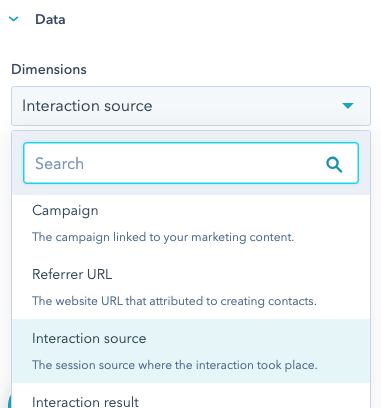
Interaction Source is a good one to start with.
Here’s an example of one of our clients - notice how social is a key driver of leads:

But let’s dig into the paid social interaction type, from the table underneath:
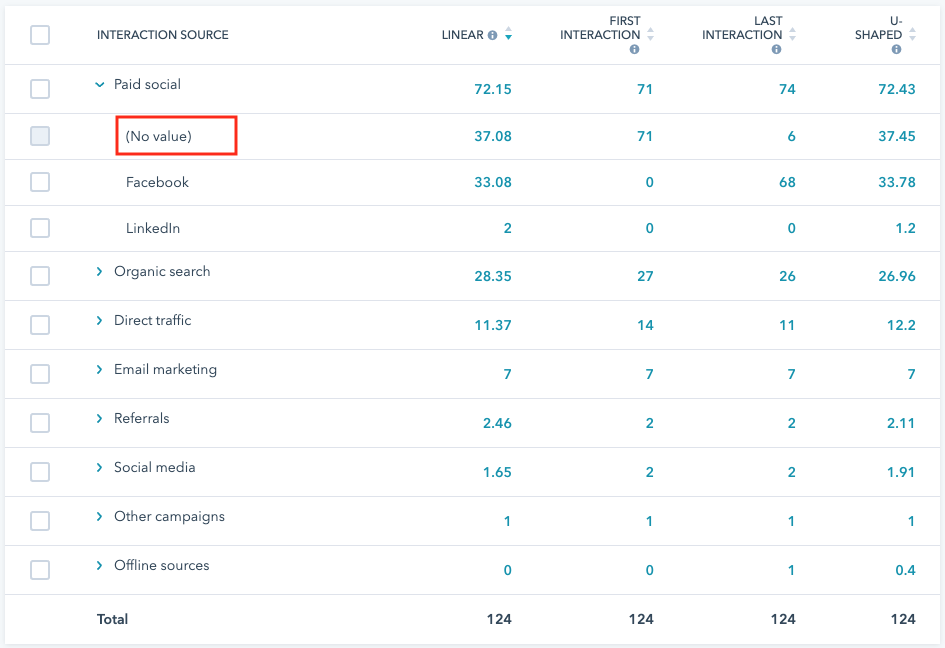
What is the (No value) line item?
At first we thought it was due to links not being tagged correctly, but after checking further it seems to be from Facebook traffic that is getting stripped of its parameters - possibly on iPhones that have the privacy settings in place.
Notice also how similar all the attribution models are. Which tends to indicate that many of the contacts converted very early (often on their first visit).
Key takeaway: Make a start. Use it to highlight gaps, and then fix your tracking.
We’ll dive into Attribution reports in further detail in upcoming episodes.
A final comment though regarding the HubSpot blog and KB articles - great as they are for explaining how to set up reports, the big value item they are missing is real world examples. There’s no examples of digging into an attribution report and gaining insights.
Another one to do with reporting and understanding the average days to close for deals. This can give you insight into what is potentially taking longer or if certain times of the year are quicker to close deals.
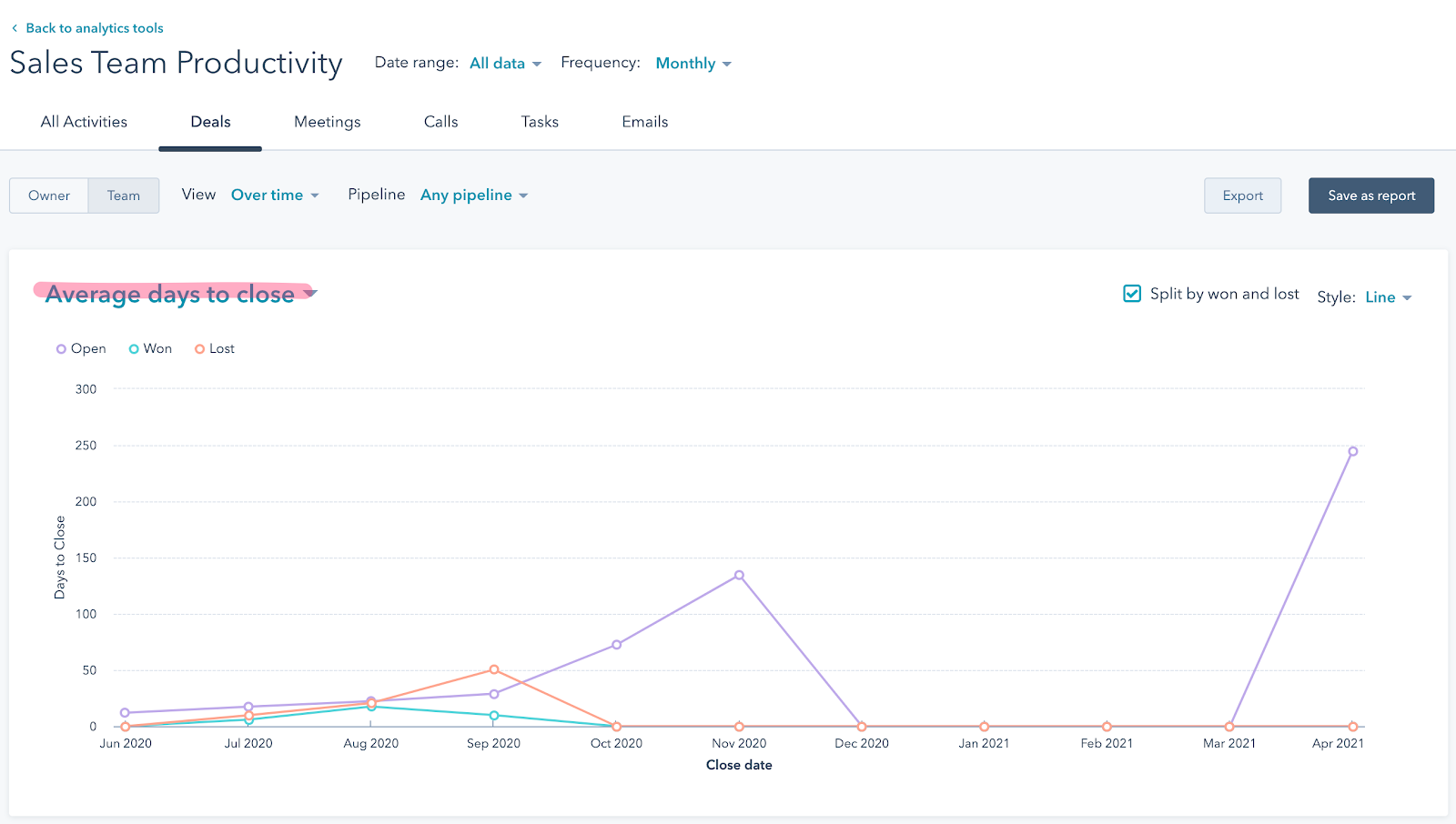
There is more information here.
You can now add comments on workflow actions:
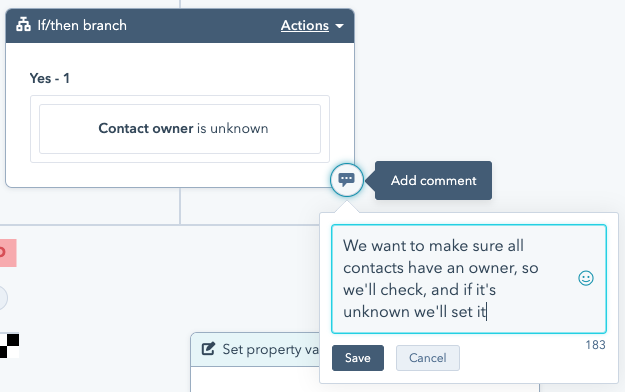
The example above is just a trivial test - you wouldn’t usually add comments like this.
This feature is going to be great for going back through and ‘documenting’ some of your old, complex workflows.
If you have one conversation inbox when you add users they end up in the inbox as users and if you for example set up your live chat to be live when only available it can seem like it is not working!

So you need to make sure you Manage your users in your inbox!
We’ve decided to move this week’s marketing tip to next week - we have too much in the show already!
Tune in next week when we’ll dig into LinkedIn Sponsored InMail tips.
Craig and Ian debate the value of online events.
Craig is largely unimpressed with virtual events and feels that there is much higher value in paid courses delivered by experts. And even in free courses such as in HubSpot Academy.
Ian has a different perspective and covers his experience attending the Grow With Video Live conference.
Here is the portal that gives you a look inside some of the items!
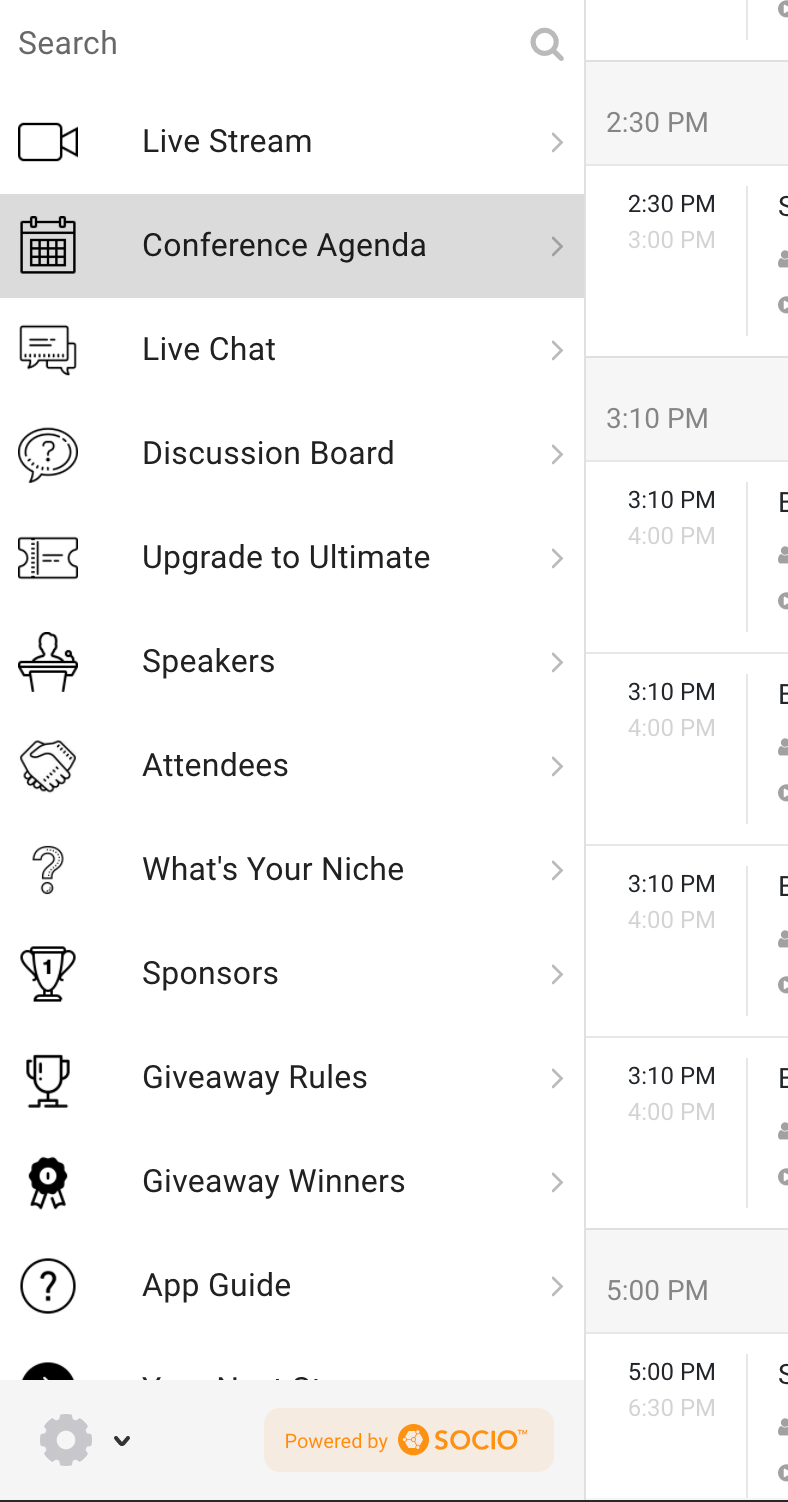
This generator is fun - it’s a joke… but is it?
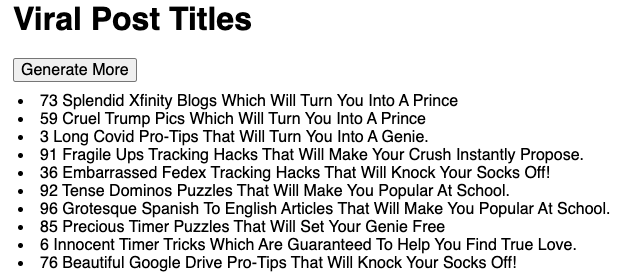
Loving this Twitter account (from the makers of FOMO) that exposes bogus marketing - here’s a beauty:
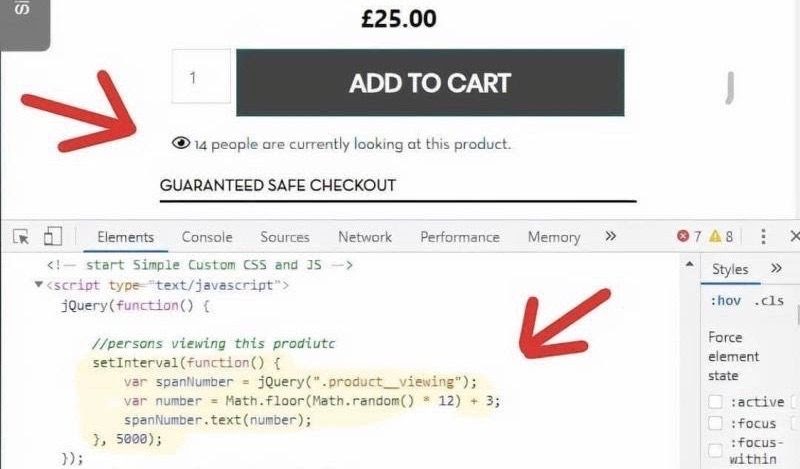
They have a Chrome extension as well.
We ran it on the HubShots site and it found 11 instances of hyperbole:
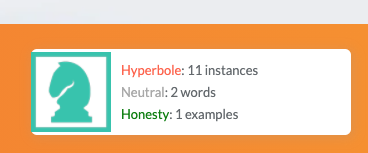
Words such as: perfect, most popular - plus it doesn’t like exclamation marks!
“And if you say you’re not creative, look at how much you’re missing out on just because you’ve told yourself that. I think creativity is one of the greatest gifts that we’re born with that some people don’t cultivate, that they don’t realize it could be applied to literally everything in their lives.”
― Timothy Ferriss, Tools of Titans: The Tactics, Routines, and Habits of Billionaires, Icons, and World-Class Performers
There’s been rumours of Apple entering the search engine space for years. Recently the rumours have started up again (via Coywolf). Aaron Wall (SEOBook) details why this is such an important topic to follow.
You may have seen the headlines about Australia’s ACCC suggesting legislation that would require Google (and Facebook) to pay media organisations for including their news on the Google Search results. Facebook has largely stayed quiet, but Google has been popping up notifications highlighting their stance. The whole ACCC approach is a debacle, but you wouldn’t know that if you read the coverage on the main Aussie news sites (who, of course, stand to benefit from it). Ben Thompson (Stratechery) has the best analysis of the topic that I’ve read.
Useful, straightforward overview of how to use Instagram Live by Sprout Social. Ian is always trying to get me to do more Insta and YouTube live stuff, but I keep resisting… I’ve gotta #gotheextra 😂
No matter your view of Facebook, there’s no denying how important the platform is for ecommerce advertisers. Digiday outlines the trends.
Connect with HubShots here:
Connect with Ian Jacob on LinkedIn and Craig Bailey on LinkedIn
HubShots is produced by Christopher Mottram from Podcastily.
Please share this with colleagues - it helps us improve and reach more marketers.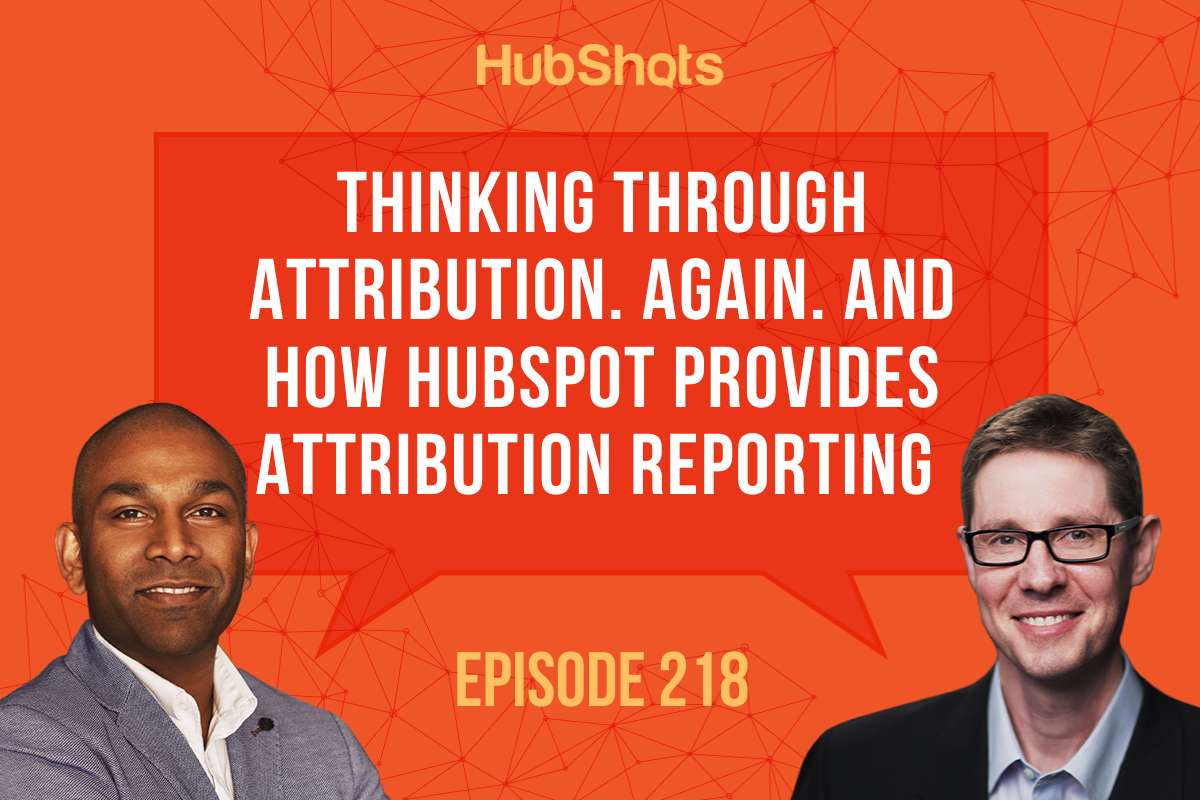
- Hi, everyone? Welcome to HubShots, episode 218. In this episode, we're thinking through attribution, and again how HubSpot provides attribution reporting. Plus some interesting things about average days to close on a sales report and viral post title generator. You're listening to Asia Pacific's number one HubSpot focused podcast, where we discuss HubSpot tips, tricks, strategies for growing your sales, marketing, and service results. My name is Ian Jacob from Search & Be Found. And with me is Craig Bailey from XEN Systems. How are you Craig?
- Hi am really well and so much to get through in this episode. Tons of notes, tons of little mini shots, as well as long shots and thanks to the people that have replied and said that they like the new, get everything, all the show notes in an email each week. So just to remind the folks to sign up on hotshots.com.
- Now listeners, before we progress, it was Craig's birthday a week ago. And so, if you do you hit him up on LinkedIn, say happy birthday and happy birthday Craig. It was a bit odd not seeing you on your birthday this year. But hopefully the next one we will.
- Thank you. Yep. Another year done.
- That's right. Hopefully we're all a bit wiser. All right, on to our growth throughout the week, Craig, and this is about thinking about attribution. And you've gone into depth here. So am gonna hand it over to you to talk about it because there are many types of attribution and listeners you would have probably encountered this if you've done Google ads, for example, before, and they talk about different attribution models. But now in HubSpot, we're seeing what we're probably used to is first touch attribution. But now we're seeing all of these different models being introduced and how do we make sense of it? So Craig is gonna walk us through that. And what the different models are.
- Yeah. We'll look at... I'll just take a step back because I've been trying to get my head around attribution lately. I mean, we've talked about it on the show a number of times before. I feel for many people, it's just this academic topic and it's very hard to actually get meaning. I think most people will say, Oh yeah, we wanna know attribution. They've got a notion of what it's about and how it's potentially useful, but there's other things that get in the way, the big one is, they don't have enough data so attribution analysis is kind of meaningless. And as we'll discuss later in the show, it's like, if they're not tagging it correctly so, you know they've been getting the right data to analyze. But also I think it becomes overly complex and so I'll start by saying simple attribution is where you start. And this can be as simple as people saying, you know what a large percentage of our revenue comes from people who use an iPhone. At its simplest I'm sure data analysts and attribution specialists wouldn't say, Oh, that's not attribution. What's the attribution model? What's, you know, where's the, last touch of the lineage? that's its simplest. And, if that's an insight you pick up, iPhone users, then that's valuable. That's actually actionable. But then what we're really getting into is this idea of journey attribution. And this is, in some ways it's a Holy grail. We wanna look across a person's entire journey, and not only one person but many people and work out what parts of that journey are actually providing value to them and pushing them on to be a customer or a revenue that comes along. And that's when it gets really hard. We'll look at this in the next shot. But then even further, down this attribution rabbit hole that we kinda fall into there's activity attribution. So it's not only are they touch this ad and then this page and this form and this social posts, but then it's Oh, sales got involved, how many activities did sales need to provide? As in, phone calls that might not have even been answered. And then finally connected all of that kind of activity attribution. That's when the real gems can come out. And I know this is what businesses are aiming for especially some of our big corporate clients. They're like, here's the questions I'll ask, how quickly do sales need to get on to leads in order to convert them? What's the minimum time? How many calls do they need to make? Or what combination of calls and assets? What kind of content, if they're viewed, makes a sales call more likely to close? Like these are hard questions to answer. But it's worth knowing that that's the end journey that, or the end result that we want to get to. We're not even close to that yet, but HubSpot, as you can see, when we go into the next shot, they're actually on their path. That's the path they're heading down because they know that's where we want to get to. So just to summarize, I think this introduction, attribution, if you can get something actionable, even the simplest attribution that's actionable go for it. Don't feel embarrassed that you're supposed to have some complex analysis and lots of data sets. But too just be aware that with great data, it does start unlocking the potential to gain these insights and therefore being across tools like HubSpot's new attribution report builder is gonna be valuable in the future.
- All right, Craig on to our quick shots of the week. And the first one is, HubSpot adding an extra export option. And this is in account and settings default. And you're able to get a log of all the users logged into your HubSpot portal, including HubSpot's staff.
- Yep. They're getting much more transparent on who's jumping into your portal and doing stuff so this was good to see.
- And also Craig, in saying that there is an option in the settings to achieve, allow or disallow, a HubSpot staff from logging in as well.
- Yeah that's true. And you know, I actually went through this with HubSpot a couple of weeks ago. I was like, what can you actually see in my portal? Can you see all the emails? Cause I'm logging all my emails in there and I asked them, can you see my emails? Can you see the threads? And the response was, no. By default HubSpot staff can't, they can see that there was an email, but they don't see any of the details. Don't see subject line, definitely don't see the thread. However, there are overrides in particular cases. So an example might be a legal issue or something like that. But by default, yeah, they can't say any of that. So just in case people are wondering if HubSpot has... And this includes Samsung support, if they're in your portal, looking at something for you, they do not see emails. Good to know.
- And the second one is a HubSpot blog and it was recently in July about the topic of how to write a blog post Craig.
- I thought this was so good because it shows, like this is my takeaway, it doesn't matter how old or dead done to death the topic might be. If you prepare and show a fresh perspective, perhaps in a different format or a better format, that adds value don't assume everyone's an expert like you are. There are beginners entering the market every day.
- And finally, Craig, there is now 3.96 billion people. That's more than half the world's population using social media. So Facebook is the leader by a big margin, followed by YouTube and WhatsApp, which is another Facebook property. So it's really good to know. And it's, I was actually shocked because you put this in the notes and then I heard it today and I was like, wow, this is like a whole game changer in terms of people that you can reach. So there you go, We've passed a magic number there.
- That's right. And so they're what we're calling our quick shots and they've got links in the show notes down in shot 12 later in the show, we've got our big shots. This is in depth recommended reading. We don't have time to cover it in the show, but that's another reason why I should sign up and subscribe to get the show notes.
- Alright Craig. Now we're gonna talk about the HubSpot market feature of the week, which is the HubSpot attribution reporting, which we have covered before in episodes 168 and 176.
- I thought we'd revisit it because it has been getting a bit of a push from HubSpot lately. And also some things that caused us a bit of alarm in 200 and episode 215 where they're deleting some old attribution reports but let's start this by saying, if you don't have good data, don't even try to use the attribution reports. So good data equals useful attribution. So some quick gotchas, before we even look at the reports in HubSpot things like making sure you're tagging all your traffic. If you're sending traffic from social, make sure you're tagging it by which I mean the UTM parameters, things like that. Paid ads is another great one. Email, make sure there's proper tracking. If you're sending from HubSpot, that's all done automatically but if using other set tools, you need to track it all. Simple things like the number of times there's links in email signatures and they're not tagged so that people can't tell. So if you're not actually tagging your traffic, then your attribution reports will be well hindered. Now Davis has a good post on the HubSpot blog and he reminds us that when we're looking at attribution reports, we need to have a goal. So with contact attribution, it's like what content or what interaction source there's many dimensions is driving a contact. So that's the preamble. And then we've linked out to good HubSpot knowledge base as well as Davis's blog where they talk you through how to set up the reports. So we're not gonna go through how to set up a report cause their knowledge base does a good job of that. The only thing I wanna highlight is this dimensions. When you've set up the report, you know, just kinda report settings, custom pop, blah, blah, blah. But it's the dimensions and there's a bunch of different dimensions. So things could be campaigns, they could be referrals, they could be interaction sources. That's the one we're gonna discuss in today's show. But, this is the key element that you want to look at. You wanting to drive into, what's driving a contact and is it content? Is it a type of content? Those kinds of things. And we've got a screenshot here. What's your takeaway from this screenshot? And we're chatting about this before the show.
- you're talking about the no value crank,
- well talking about interaction sources like
- Oh yeah
- It's just mess of numbers.
- Correct. it's kind of like, how do you make that actionable? Got many of your clients using attribution reporting?
- No Craig, they're not.
- What's the reason they're not using it, out of interest?
- Ain't just not up to that stage of, I guess, asking those questions and some of them just don't have the data to use
- Am sure data is the most common reason. And for most of our clients, we're not going through it with them because yeah, it's just not meaningful. I've got a screenshot in here in the show notes, which shows we've gone interaction source and drilling into social. And when you look at the numbers, it's really hard to know what's the takeaway from this. How do you actually make this actionable?
- Mmmh And well, I'll give the example in this case, like it's paid social is a big driver, but what we're finding in this particular client is that paid social is often their first interaction. They often sign up and be a common a contact. So it's like, well, the attribution report, doesn't give us a lot of insight that we didn't actually realize from, well, just knowing that social drives traffic and signups. So the reason I've put this in the show is because it highlights, how hard it is to get insight from attribution reports. And one of the things I wanted to mention, is that when you look at the knowledge base and the blog posts they talk through, they don't give real world examples. And I think this is really what's missing from HubSpots side. They really need to give us real world examples where they walk you through diving into a real attribution report and showing us how to get insights. And so that's, in some ways, the takeaway, from this segment. In future shows, I think Ian, you and I, this is a big value add, we will talk through some of the attribution reports for some of our clients. We'll give screenshots and we'll dig into it to show you how you actually can get takeaways from them.
- So Craig, you did wanna talk about the key takeaway would be to make a start and use it to highlight gaps and then fix your tracking because in the screenshot that you see, you'll see, there is a part of the screenshot that says there's no value. And then dive into that attribution reporting further on.
- Make a start. You can't go wrong making a start, but don't get disillusioned if you can't get insights.
- Now listeners onto our HubSpot sales feature of the week. And this is to do with the report. And if you're in sales and you're looking at different metrics to, what drives sales and how to close things quicker, this is a good report. And this is the average days to close report on the sales team productivity dashboard. And you can actually add this to, a dashboard as a report as well. But what's interesting out of this is, look at it in a perspective of how do you understand, based on seasonality perhaps. Are things closing quicker or taking longer to close? So I guess what's interesting in the screenshot that I gave, which is from one of our portals, is that there are obviously some deals that are a bit more in the future into next year and potentially the days to close on that is now cutting from now to that period. So it just seems like it's a long, it's a long laid time and that could be possibly because they've had a conversation with somebody and they've said, look, we're not looking at doing this til March, 2021. So just to understand that, and I guess you can see what's been won, what's been open and what's being closed. So it's a really good indication of understanding and then drilling deeper into what sort of activities are making this work or go faster or slower. So I thought I'd highlight that today as an example.
- That's a great report and a common one that sales managers ask for, it's very, very common and great to see HubSpot providing it so clearly.
- The precursor to this was two episodes ago. We talked about the pipeline and the forecasting. So have a look at that from two episodes ago. Now, on to our HubSpot extra the week. And this is comments on workflow actions, Craig, and this has just rolled out. And why would this be useful instead of just making random codes on a workflow actions? And you rightly put it here, that it's a great place to document some of your old and complex workflows and understand why you did certain things. And so it's a welcome addition. Let's put it that way.
- #it's the little things.
- Correct
- These little things that just improve the product.
- Yeah, I think that's really good.
- So talking about little things there, Craig, I heard somebody complaining it's the little things that make them annoyed because things keep changing all the time. I said, well, that's just the improvement.
- Can't please everyone, can you? Can't please everyone. Anyway, there's an opposite side to, that coin. Okay, onto our HubSpot gotcha of the week, Craig. And this is to do with the conversations inbox and had a customer who is using live chat. And they said to me, look, can we just make it, but during business hours, I said, that's great. And progressively, over time, they've added people into their portal. Now they are using the starter product. I think they'd left for lunch. Anyway, they said, we're still getting notifications there's live chat going on. I'm like, hang on. What's going on? Anyway I tracked it down. And I went to have a look and I looked in the inbox and I looked to see who was actually logged in. And then I went, hang on. There are all these people in the inbox and obviously the people that were not logged in were away and the people who were in the system, who probably had no idea that they were logged into the inbox where shown as available. So at which point I then took people out of the inbox or changed their status and made sure that they weren't. So, there's was a little gotcha because I was like, there's something wrong here. And it's all to do with managing your users that are active in your inbox. All right, Craig, onto our marketing tip of the week.
- Yes. And the marketing tip is, that with putting the marketing tip next week.
- So stay tuned.
- Thanks for watching. the show Yeah. I'm gonna walk you through LinkedIn sponsored emails. Next episode. I've had a good session with a client this week talking about that. So yap, tune in next week for that.
- Alright our Insight of the week, Craig. Are virtual events worth attending?
- I guess I'm gonna be a bit of a naysayer here everyone's gone virtual and Inbound of course is the example here. Inbound is all virtual, but there's so many virtual events and my question is, are they even worth attending? I'm gonna say, I don't think they are. Like I won't be attending Inbound Live. I might watch some of the recordings later, but really here's my reasoning. I think I can get much better value paying for high quality training from expert teachers. And so I'll pay for training, but you know what, I actually reckon sometimes you get better from just the HubSpot Academy going through one of their courses. There are exceptions so for example, when Chris O'Donnell is doing his product announcements, Yeah, I would tune into Inbound for that.
- Correct.
- But for all the other sessions, I'm gonna be hard pressed to stay up first of all, late at night and give the time zone here to attend for something that I haven't seen before. And so I'm not confident it'll be great. It could be a waste of time. The other thing about training and I do this podcast as well. I can watch a double speed or 1.5 times speed. You can't do that with an online event, unless you were watching recordings afterwards. And so my feeling is that virtual events are gonna burn people out. And I suspect a lot of companies just won't do them. Everyone's jumped on the bandwagon and doing them now. Of course, they've had to adapt and well done to all the companies that have changed and people tend to do that. But are they worth attending? I'm gonna say most of the time, they're not. That's my opinion. I know you have a different opinion though, Ian. what's your opinion?
- Correct Craig. In this week I have been attending live because we're doing some video training growth video live, which is happening in Las Vegas. So under normal circumstances, I guess I would have gone to Las Vegas, to learn and to meet other people but I've been on this. I've just done a day of it. And it's been interesting. So I guess time zone is a big factor here. And I was thinking, how am I gonna do this? Listeners, I've put a screenshot of what's available in the portal, because it is online, how people are interacting and it's kinda been interesting. They've tried to replicate. If you think about Inbound, they've tried to replicate, you know, here's what's coming up, here's how to interact, you know, just the same that they would run on the screens, at Inbound where they're saying, you know, use this hashtag, take a picture and send it to us. So, they've tried to keep that, they've actually done a good job of recording all the intermissions. They've kept all the sessions quite punchy, which has been really good. But yes, you know what? at the end of the day I was sitting in my bed watching it and it got to a point of the early hours of this morning I was like, I've just had enough. I need to sleep for a little while before I get to work. Then I was thinking, yeah, you know what? Like it was kind of half an event, but rightly in talking to you, I could essentially have just gone, well, I'll just watch the replays, right? I'm not sure and I'm undecided like, yes, I want to stay up to watch the product announcements, but everything else, you know, I could probably take it or leave it to be honest.
- It'll be interesting to see whether always virtual events survive into future years because I think the live, the in-person conferences, one half of them won't come back, well not for a long time yet. But the virtual conferences, I think will die out. People are just gonna get sick of them. However, the flip side is, there's a race to zero, race to the bottom, for these online events. It's kinda like webinars. Have we talked about this on the show before? I could never understand why people attend webinars. I'm like, just go to YouTube and watch it. And you can watch it doubles, like I can never understand why people sign up for webinars and then attend the webinars. I can understand, sign them up just to get them sent later or the link later maybe. But you know, a webinar, it seems like all these online events they're just like webinars maxed out, you know, it's like, who attends these? Well obviously lots of people do. I realize I'm in the wrong and the minority here. I just don't get it. But it also shows that if you've got an event and you need to be engaging with people and you need to be engaging with people that if you haven't switched over to an online or virtual event, then you are behind. It's not like a virtual event is special these days it's just table stakes. So if you do need to be playing in that level, then you must have your virtual event game on.
- Now Craig, you've got your whole, all of the week.
- Did you see this? This viral post title generator?
- You can go to the link and you'll see the code they put behind it. It just, you know, pulls together random words. Look at some of these ones, 85 precious time of puzzles that will set your genie free 92 tents dominoes pizza puzzles that will make you popular at school. Like it just randomly makes these up. I'm sure I used to see articles like this on Buzzfeed and stuff. You see it. It was just junk. And anyway, this is, folks, this is a joke. Or is it?
- You know what i liked? Six innocent timer tricks, which are guaranteed to help you find true love. Anyway, let's continue on Craig. and they have a chrome extension as well. All right, on to our quote of the week list is, and this one is from--
- Oh no, hang on, hang on. You missed the results of the week. Dishonest marketing examples.
- Oh yes Sorry
- Did you see this?
- Oh yeah. So there's a Twitter account called Dishonest Marketing. I love this. They call out and expose all these dishonest marketing. So you know, those ones that have fake scarcity,
- Correct
- such as are only six left. And then you look behind the scenes and that's a random
- Yes bit of JavaScript that makes them. I've got a great one in the show notes here where it says over 14 people are currently looking at this product as if, you know, to make it look popular. It's just bollocks. It's just JavaScript, random number bond. I love how they expose this cause I hate that stuff. I hate all that fake bogus.
- It is dishonest
- It is dishonest
- So following that. But yeah, they've got the Chrome extension, which tells you when you're on a site, it tells you whether it's I'm being dishonest. I ran it across the HubShots site and it highlighted 11 instances of hyperbole.
- Right So hyperbole is like, cause we say the podcast it's perfect
- stuff like that. Luckily wait, we're not doing anything dishonest, you know, in the real sense, but yeah, it's pretty good. Pretty funny.
- So there you go only says, download the Chrome extension and have a little chuckle throughout the day. All right. And our quote of the week, Craig, and this is from Tim Ferriss Tools of Titans, The Tactics, Routines, and Habits of Billionaires Icons and World Class Performance. And it says, "and if you say you're not creative, look at how much you're missing out on just because you've told yourself that. I think creativity is one of the greatest gifts that we're born with. And some people don't cultivate that they don't realize it could be applied to literally everything in their lives." And we have our big shots of the week listeners. So subscribe to our newsletter, and you'll get that.
- I'll just highlight some of them. We talk about Apple going into the search engine space, roam and sort of resumed of them creating a search engine. But also the big one for us down Australia is Australia versus Google and Facebook and the Australians ICCC, a government legislation trying to make Google and Facebook paid media organization. It's just a debacle really.
- Mmmh It can't work. Well, that's my opinion. I know I'm in a minority view and well and if you look at how it's being reported but.
- Hmm
- We've got some links SAY, and mainly to Ben Thompson stratechery he's got an excellent analysis on it. So make sure you read those.
- And then we've got about how to go live on Instagram, which one day Craig and myself will, will do and how E-commerce grads relies a lot on Facebook advertising. Now listeners, thank you for listening and please connect with us on LinkedIn. When you do connect with us, please send us a message to say that you do listen to the podcast. That would be fantastic. And we hope you have a great week until next time, Craig.
- Catch you later, Ian.
- Hey there, thanks for listening to this episode of HubShots. To get the latest show notes, HubSpot tips and marketing resources. Sign up at HubShots.com. You can also book time with us to help you grow better.
- With HubSpot.
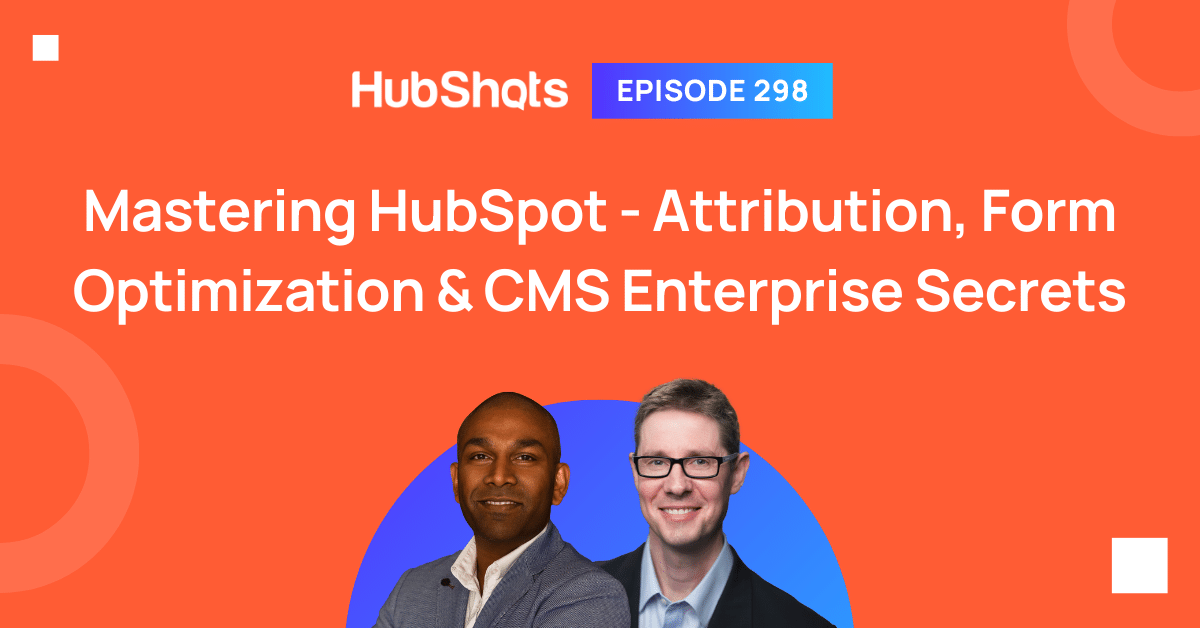
Welcome to HubShots Episode 298: Mastering HubSpot - Attribution, Form Optimization & CMS Enterprise Secrets This edition we dive into: Be...
Welcome to Episode 168 of HubShots! HubShots - APAC's number 1 HubSpot focussed podcast - where we discuss HubSpot tips & tricks, new features, and...
Welcome to Episode 176 of Hubshots! HubShots - APAC's number 1 HubSpot focussed podcast - where we discuss HubSpot tips & tricks, new features, and...